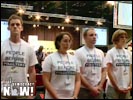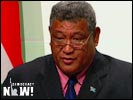-
Hopes Fade for Binding Climate Deal as Durban Summit Enters Final Stages

We are broadcasting from Durban, South Africa, in our week-long exclusive at the United Nations Climate Change Conference. Talks have entered their 10th day, but doubt is growing that a legally binding deal to combat climate change will be reached by Friday. On Tuesday, United Nations Secretary-General Ban Ki-moon acknowledged that such a deal is “beyond our reach” for now due in part to the global financial crisis. But Ban urged world leaders to preserve the Kyoto Protocol, which binds some of the largest historical polluters to binding emissions cuts.
-
Canadian Activists Barred from Durban Summit for Protesting Environment Minister

Canada’s Minister of Environment Peter Kent addressed the United Nations Climate Change Conference today and defended his country’s environmental record despite Canada’s support of continued tar sands oil extraction and its threat to pull out of the Kyoto Protocol. Soon after Kent began speaking, six members of the Canadian Youth Delegation stood up and turned their backs on the minister. They were taken out of the room and later stripped of their credentials to the climate change conference. “Today, six of us stood up and turned our backs on the government of Canada, in the same way the government of Canada has turned its back on us,” says activist Karen Rooney. “We are calling on the government of Canada to start putting the interests of people over the interests of polluters.”
-
Tuvalu Minister Urges World Leaders to Save Pacific Nations From Rising Seas

One of the most impassioned speeches at the United Nations Climate Change Conference was given today by Apisai Ielemia, the minister of foreign affairs, trade, tourism, environment and labor for the Pacific island state of Tuvalu. Ielemia’s country is among a number of island nations threatened by the rising seas caused by global warming. “It is vitally important that the international community take immediate and decisive action to address climate change now, not tomorrow, not in 2015, and definitely not in 2020,” Ielemia says. “Urgency must be the theme of this conference. We have no time to wait, and we are only a few inches from the point of no return.”
-
Least Developed Countries, Small Island States Face U.S. Resistance to Binding Climate Deal

As the U.N. Climate Change Conference opened in Durban last week, the Least Developed Countries group and the Alliance of Small Island States presented proposals saying a climate deal that covers all countries must be reached within a year. The drafts received support from the European Union, but not from other developed countries-including the United States-or from larger developing countries like India, China and Brazil. The 48-country Least Developed Countries bloc (LDCs) includes drought-prone states such as Ethiopia and Mali, countries with vulnerable coastal zones including Bangladesh and Tanzania, and countries especially vulnerable to melting glaciers as a result of global warming, like Himalayan mountain states Bhutan and Nepal. The Alliance of Small Island States, or AOSIS, has 39 members, including many Pacific and Caribbean islands, some of which are very low-lying and heavily impacted by sea-level rise. We speak to Dessima Williams, chair of the Alliance of Small Island States, and Pa Ousman Jarju, chair of the Least Developed Countries group. “The importance of this COP is that the agreements that have been reached in 2007 have not yet been fulfilled,” says Williams. “The most important negotiation that must be concluded here, if we are to remain true to what we did in the past, is the second commitment of the Kyoto Protocol, which encompasses rules and levels of greenhouse gas reduction for the major emitters historically.”
-
Nobel-Winning IPCC Chair Rajendra Pachauri Urges Obama to “Listen to Science” on Global Warming

One of the world’s most prominent experts on climate science, Rajendra Pachauri, is criticizing negotiators at the U.N. Climate Change Conference in Durban for not paying enough attention to science. Pachauri is chair of the Intergovernmental Panel on Climate Change, which won the 2007 Nobel Peace Prize along with Al Gore. “What we have done is we have increased the concentration of these greenhouse gases in the atmosphere far beyond what has taken place over the last 650,000 years,” Pachauri says. “As a result, during the 20th century, we had average warming of about 0.74 degrees Celsius, sea-level rise of about 17 centimeters, and a whole range of impacts, as I mentioned, on human health, on agriculture, on ecosystems… The IPCC Fourth Assessment Report had clearly brought out that if we want to limit temperature increase to two degrees or thereabouts, two to 2.4 degrees Celsius, and if we want to do it at least cost, then emissions will have to peak no later than 2015. And we are now talking about 2020. That means the world will incur a much larger expense in reducing emissions. And in the meantime, we’ll also suffer far more serious impacts of climate change.” When asked about the position of the United States in the negotiation, Pachauri says, “I would also ask President Obama to listen to the voice of science. And he has an absolutely outstanding science adviser in John Holdren. Maybe he should get John to organize a meeting of the scientists soon after he’s re-elected-if he’s re-elected-and then determine U.S. policy, as should be the case with every country in the world, based on the scientific evidence that’s available.” Pachauri continued, “Actually, to be honest, nobody over here at COP 17 is paying any attention to science.”
2011-12-07 13:00:00 – RF/Democracy Now!

